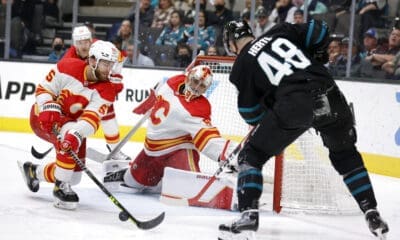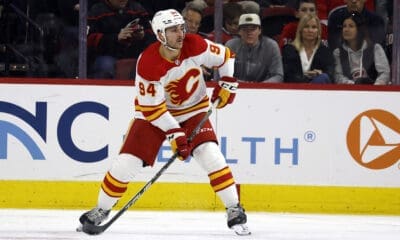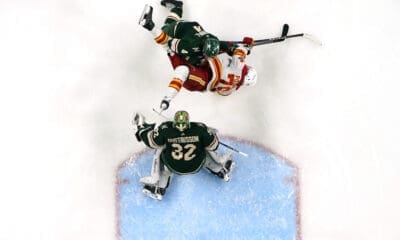Calgary Flames
Did the Flames Overpay on Huberdeau Contract?

Jonathan Huberdeau will spend the next nine seasons with the Calgary Flames.
But did the franchise pay too much for the 29-year-old winger?
Since the signing, there has been much debate. Flames fans are relieved someone signed long-term after losing Johnny Gaudreau and Matthew Tkachuk this summer.
The answer on overpayment is complicated. In fact, there may not be an answer. At least not one answer.
With an $84 million deal – the richest in Calgary Flames history – spanning over eight seasons, you can look at it from plenty of angles.
The salary cap hit itself is $10.5M per season. From a Flames standpoint, that’s reasonable for a player who scored 30 goals and 115 points last year to finish second in the Art Ross Trophy race and fifth in the Hart Trophy voting.
As for the player’s perspective, it was Huberdeau’s best chance at cashing in with no guarantees that career year will be duplicated this season.
If you look at it long-term and the relative value down the road — say, when Huberdeau is in his mid-30s — you can suggest the team will be shelling out too much.
And you might be right. Chances are his impact as a player won’t be the same. There are exceptions, but very few, to the inevitable decline with age.
Ryan Getlaf had a nice send-off season at 37. Joe Thornton didn’t drop off until his 40s. Henrik Zetterberg was going strong right until his retirement at 38. Could Huberdeau do the same?
There are many other things to consider when it comes to that term, including the ability to dump the contract, or buy it out. More on that later.
Let’s look at the here and now.
Huberdeau’s extension doesn’t kick in until 2023-24, but the massive cap hit would rank in the top 10 this year. That’s right on par with market value considering only Connor McDavid ($12.5M) finished with more points last season.
It would be easy to look at the contracts former Calgary Flames stars Gaudreau ($9.75M) and Tkachuk ($9.5M) signed in Columbus and Florida and suggest they’re better because they’re cheaper, or in Tkachuk’s case, because he’s five years younger. But you can’t judge a contract without taking every element of its fabric into consideration.
How much would Huberdeau have received on the open market next summer?
Unless he has a major drop off this season, at least as much as he received from the Flames.
Maybe he doesn’t hit 100 again but even a point-per-game season that’s seen as a dip would make him a top draw as a UFA a year from now.
Will the salary cap rise to lessen his overall percentage over the course of the contract?
The salary cap is going to start making serious jumps. And barring another labour stoppage, it’s likely that Huberdeau’s impact on the overall cap situation for the Calgary Flames is going to drop a little at a time over the course of the contract.
What other options were out there for the Calgary Flames to replace the two 100-point players who chose to leave?
None, really. With Tkachuk determining he’d go the Gaudreau route next summer, GM Brad Treliving’s hands were pretty much tied. He made the move to bring Huberdeau in and there was nobody of his calibre available on the open market.
And the market is going to be vicious when it comes to a player like Patrick Kane, who might hit the NHL trade block before or during the season.
It was either go all-in on Huberdeau or start rebuilding. And that’s a whole other argument.
Can the Flames get out of the contract down the road?
There were a couple of interesting elements in the creation of the contract. One, it was bonus heavy. The actual salary makes it very trade and buyout friendly.
And while there is a full no movement clause, there is also a modified no-trade clause for the final two years, which means he can’t be sent to the minors but has to provide a list of eight teams that he can’t be traded to.
There are many ways to get out of the cap crunch when the deal starts to look sour.
Does the deal even really matter beyond the first five or six seasons?
Ultimately, it’s about winning. The Calgary Flames are unwilling to rebuild and feel ready to take another step forward after winning the Pacific Division in two of the last three seasons.
Huberdeau and fellow Panthers trade piece MacKenzie Weegar are critical pieces of keeping that winning window cracked open this year.
If the team can go on a deep run or win the Stanley Cup, no one is going to be talking about the Huberdeau contract next summer.









